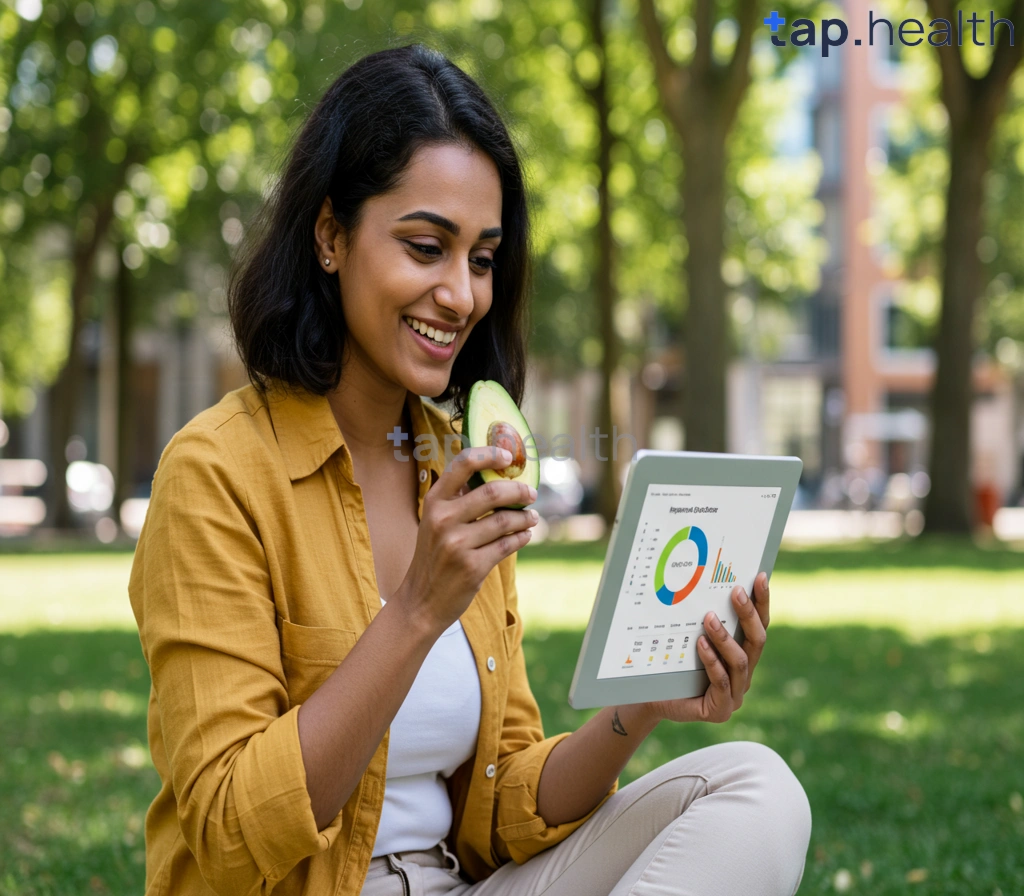Table of Contents
- Avocado and Diabetes: A Natural Approach to Blood Sugar Control
- Can Avocados Help Manage Blood Sugar Levels? A Detailed Guide
- Unlocking the Benefits of Avocado for Diabetes Management
- Avocado for Blood Sugar: Exploring the Science-Backed Evidence
- Is Avocado Good for Diabetics? Nutritional Facts and Expert Tips
- Frequently Asked Questions
- References
Managing diabetes can feel like navigating a complex maze, but what if a simple, delicious food could offer a helping hand? We’re diving into the world of Avocado for Diabetes: Unlocking Nature’s Blood Sugar Benefits. This creamy, nutrient-rich fruit isn’t just a tasty addition to your toast; research suggests it may play a significant role in supporting healthy blood sugar levels. In this post, we’ll explore the science behind avocados and diabetes, uncovering how their unique properties could benefit your health. Get ready to discover how this superfood might just become your new best friend in managing your diabetes!
Avocado and Diabetes: A Natural Approach to Blood Sugar Control
Managing blood sugar levels is crucial for individuals with diabetes, and making informed dietary choices is key. A significant portion of the global diabetic population, 61% of whom are aged between 20-64 years, according to the IDF Diabetes Atlas, are actively seeking effective management strategies. In Indian and tropical countries, where access to fresh produce is often readily available, incorporating foods like avocados can offer a natural and delicious approach to blood sugar control.
The Benefits of Avocados for Diabetes Management
Avocados are unique in their nutritional profile. They’re low in carbohydrates, a factor that significantly impacts blood sugar levels. Furthermore, avocados are rich in healthy monounsaturated fats, which can improve insulin sensitivity. This means your body uses insulin more effectively to regulate blood glucose. The fiber content in avocados also plays a crucial role; it helps slow down the absorption of sugar into the bloodstream, preventing rapid spikes. Incorporating avocados into your diet can contribute to better blood sugar control and overall health. For a more comprehensive look at the amazing health benefits of this fruit, check out The Amazing Health Benefits of Avocado.
Practical Tips for Incorporating Avocados
For individuals in Indian and tropical countries, incorporating avocados into your daily meals is relatively easy. Add slices to your salads, blend them into smoothies, or use them as a healthy substitute for less healthy fats in traditional dishes. Remember that while avocados offer numerous benefits, they shouldn’t replace medical advice or prescribed medication. Always consult your doctor or a registered dietitian for personalized guidance on managing your diabetes. Especially for the 39% of the diabetic population aged 65+, as per the IDF Diabetes Atlas, personalized dietary advice is crucial. Considering other fruits, you might also want to learn more about Is Watermelon Good for Diabetes?
Taking Charge of Your Health
By making mindful dietary choices and incorporating nutrient-rich foods like avocados, individuals with diabetes in Indian and tropical countries can take a proactive role in managing their health. Remember that consistent healthy eating habits, alongside regular exercise and medical supervision, are key to long-term well-being. Consult a healthcare professional to create a personalized diabetes management plan that incorporates the benefits of avocados and other healthy foods suited to your specific needs and lifestyle.
Can Avocados Help Manage Blood Sugar Levels? A Detailed Guide
Daily consumption of sugary beverages raises diabetes risk by 26%, highlighting the urgent need for effective blood sugar management strategies. In India and across tropical countries, where access to fresh produce is often high, avocados present a promising natural solution. This detailed guide explores how this creamy fruit can contribute to healthier blood sugar levels.
Understanding the Avocado’s Role in Blood Sugar Control
Avocados are uniquely rich in healthy fats, specifically monounsaturated fats. These fats don’t significantly raise blood sugar levels like refined carbohydrates do. Furthermore, avocados are low in the glycemic index (GI), meaning they cause a slower and more gradual rise in blood glucose compared to high-GI foods prevalent in many Indian and tropical diets, such as white rice or sugary snacks. This slow release of sugar aids in preventing those dramatic spikes often associated with diabetes management challenges.
Practical Tips for Incorporating Avocados into Your Diet
Incorporating avocados into your daily meals can be simple and delicious. Try adding avocado slices to your morning dosa or idli, blending it into a smoothie with other fruits and vegetables, or using it as a creamy base for curries. The versatility of avocados allows for seamless integration into various cuisines popular across India and tropical regions. Remember to always choose ripe, fresh avocados for optimal nutritional value. Moderation is key, even with healthy foods.
Regional Considerations & Conclusion
The accessibility and affordability of avocados vary across different regions of India and tropical countries. However, where available, incorporating avocados into a balanced diet can be a valuable tool in supporting healthy blood sugar levels. For more natural remedies to help manage blood sugar, check out our article on Top 8 Natural Remedies to Improve Blood Sugar Levels. Remember to consult with your doctor or a registered dietitian for personalized dietary advice tailored to your specific needs and health status. They can help you create a meal plan that effectively incorporates avocados while considering other factors relevant to your region and lifestyle. You might also be interested in learning about another fruit with potential blood sugar benefits: Is Guava Good For Diabetes? Let’s Find Out!
Unlocking the Benefits of Avocado for Diabetes Management
Did you know that up to 80% of Type 2 diabetes cases can be delayed or prevented through lifestyle changes? This includes incorporating foods like the humble avocado, a nutritional powerhouse particularly beneficial in tropical and Indian climates. Avocados, readily available and affordable in many parts of India and other tropical regions, offer unique advantages for managing blood sugar levels.
The Avocado Advantage: More Than Just Healthy Fats
Avocados are rich in monounsaturated fats, which help improve insulin sensitivity. This means your body can utilize insulin more effectively, leading to better blood sugar control. Unlike many high-fat foods, avocados also boast a significant amount of fiber. Fiber slows down the absorption of sugar into the bloodstream, preventing those post-meal blood sugar spikes. This is crucial for individuals managing diabetes. Furthermore, avocados are packed with essential nutrients like potassium and vitamin K, contributing to overall health and well-being.
Practical Tips for Integrating Avocados into Your Diet
Incorporating avocados into your daily meals is surprisingly simple. Add slices to your salads, blend them into smoothies for a creamy texture, or mash them into healthy dips with spices popular in Indian cuisine like cumin and coriander. Remember to choose ripe avocados for optimal flavor and texture. Consider consulting a nutritionist or doctor for personalized dietary advice tailored to your specific needs and health status. Remember, avocados are a complementary part of a holistic approach to diabetes management, not a cure-all. For more comprehensive tips on diabetes management, check out 10 Proven Tips to Effectively Manage Diabetes | Simple Guide.
Taking Charge of Your Health: A Regional Focus
For individuals in India and other tropical countries, the easy accessibility and affordability of avocados make them a powerful tool in combating diabetes. Make the smart choice to incorporate this nutrient-rich fruit into your diet and take a proactive step towards better health. Consult your healthcare provider to discuss incorporating avocados into your diabetes management plan. Learning more about effective strategies can significantly improve your overall health, and we recommend reading 10 Proven Tips for Effective Diabetes Management for additional guidance.
Avocado for Blood Sugar: Exploring the Science-Backed Evidence
The alarming statistic that 50% of diabetes cases worldwide remain undiagnosed (source) underscores the urgent need for accessible information on managing blood sugar levels. In many Indian and tropical countries, where diabetes prevalence is high, readily available and culturally relevant solutions are crucial. This is where the humble avocado steps in. Could this creamy fruit be a surprisingly effective ally in the fight against diabetes?
Understanding the Avocado’s Impact on Blood Sugar
Avocados are rich in healthy monounsaturated fats, fiber, and various micronutrients. These components contribute to improved insulin sensitivity and help regulate blood sugar levels. The fiber in avocados slows down the absorption of sugar into the bloodstream, preventing rapid spikes in blood glucose. Furthermore, the healthy fats support overall metabolic health, a critical factor in managing diabetes. While not a cure, incorporating avocados into a balanced diet can be a beneficial strategy for individuals managing their blood sugar levels. For more information on maintaining healthy blood sugar levels, check out this helpful resource.
Practical Tips for Integrating Avocados into Your Diet
For those in India and other tropical regions, incorporating avocados into familiar dishes is key. Add avocado slices to your morning dosa or idli, blend it into a refreshing smoothie with local fruits, or use it as a healthy fat source in curries. The versatility of the avocado makes it easy to adapt to various cuisines and dietary preferences. Remember to always consult with your doctor or a registered dietitian before making significant changes to your diet, especially if you have diabetes. Regular monitoring of your blood sugar levels remains vital.
Taking Charge of Your Health
With diabetes impacting millions, particularly in regions like India and throughout the tropics, proactive steps are essential. Exploring natural, readily accessible options like avocados, while maintaining a balanced diet and regular exercise, can significantly contribute to better blood sugar control and overall well-being. Remember, knowledge is power – take charge of your health today. It’s important to note that while avocados can be beneficial, other factors, such as the use of substances like marijuana, can also impact blood sugar levels. For more information on this complex topic, you may wish to read about Is Marijuana Good for Diabetes? Exploring the Effects and Benefits.
Is Avocado Good for Diabetics? Nutritional Facts and Expert Tips
Understanding Avocado and Blood Sugar
Managing blood sugar levels is crucial for individuals with diabetes, and dietary choices play a significant role. While many fruits are viewed cautiously, the avocado presents a unique case. Its creamy texture and rich flavor make it a delicious addition to many dishes popular in Indian and tropical cuisines. But is it a suitable choice for those managing diabetes? The answer is nuanced. Avocados are low in carbohydrates compared to many other fruits, typically containing around 13 grams of carbs in a medium-sized avocado. This falls below the suggested 45–60 grams of carbs per meal for many people with diabetes, making it a potentially beneficial addition to a balanced meal plan. However, individual needs vary, so moderation is key.
Nutritional Benefits for Diabetics
Beyond the lower carb count, avocados offer other advantages. They’re rich in healthy monounsaturated fats, which can help improve insulin sensitivity and cholesterol levels, both crucial factors in diabetes management. Furthermore, avocados are packed with fiber, which aids in regulating blood sugar by slowing down glucose absorption. Incorporating avocado into your diet can contribute to better overall health and potentially improve blood sugar control. Think of it as a valuable addition, not a cure-all. For more information on other fruits and their impact on blood sugar, you might find our article on Is Sweet Potato Good for Diabetics? A Comprehensive Guide helpful.
Practical Tips for Indian & Tropical Diets
Incorporating avocados into Indian and tropical diets is surprisingly easy. Consider adding slices to your morning dosa, blending it into a creamy smoothie with coconut milk and spices, or using it as a base for a healthy guacamole dip with whole-wheat crackers. Remember that portion control is paramount. Consult with your doctor or a registered dietitian to determine the appropriate amount of avocado to include in your individual meal plan. They can help you tailor your diet to your specific needs and ensure it complements your existing diabetes management strategy. Enjoy the benefits of this versatile fruit responsibly! Considering other beverages, you may also want to read our expert advice on Can a Diabetic Patient Drink Coconut Water: Expert Advice.
Frequently Asked Questions on Avocado for Diabetes
Q1. Can avocados help manage my diabetes?
Avocados may help manage blood sugar levels due to their low carbohydrate content, healthy fats, and fiber. These properties can improve insulin sensitivity and slow sugar absorption. However, they are not a cure and should be part of a balanced approach to diabetes management.
Q2. How should I incorporate avocados into my diabetes diet?
Include avocados in moderation as part of a balanced meal plan. They can be added to salads, smoothies, or used as a healthy fat source in meals. Always consult a healthcare professional or registered dietitian to determine the appropriate amount for your individual needs.
Q3. Are there any risks or limitations to eating avocados for diabetes?
While avocados offer potential benefits, they are not a replacement for medication or medical advice. Moderation is key, and individual responses may vary. Consult with your doctor or a dietitian to ensure avocados fit safely within your personalized diabetes management plan.
Q4. What other lifestyle changes should I make alongside eating avocados?
For effective diabetes management, combine a balanced diet including avocados with regular exercise and consistent medical supervision. A holistic approach, including prescribed medication and regular check-ups, is crucial.
Q5. I’m in India/a tropical region; are avocados particularly beneficial for me?
Avocados are readily available in many tropical regions, including India. Their potential benefits for blood sugar management make them a valuable addition to a healthy diet in these areas. However, remember that personalized medical advice is still vital, regardless of location.
References
- A Practical Guide to Integrated Type 2 Diabetes Care: https://www.hse.ie/eng/services/list/2/primarycare/east-coast-diabetes-service/management-of-type-2-diabetes/diabetes-and-pregnancy/icgp-guide-to-integrated-type-2.pdf
- What is Diabetes: https://www.medschool.lsuhsc.edu/genetics/docs/DIABETES.pdf



